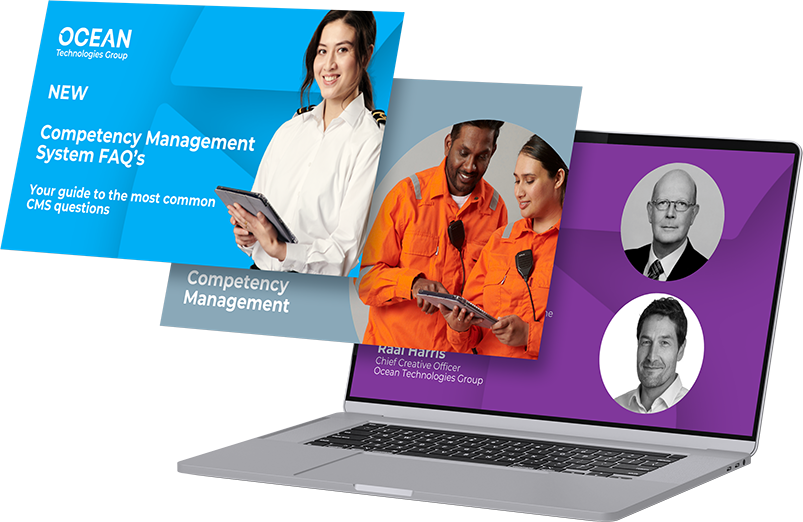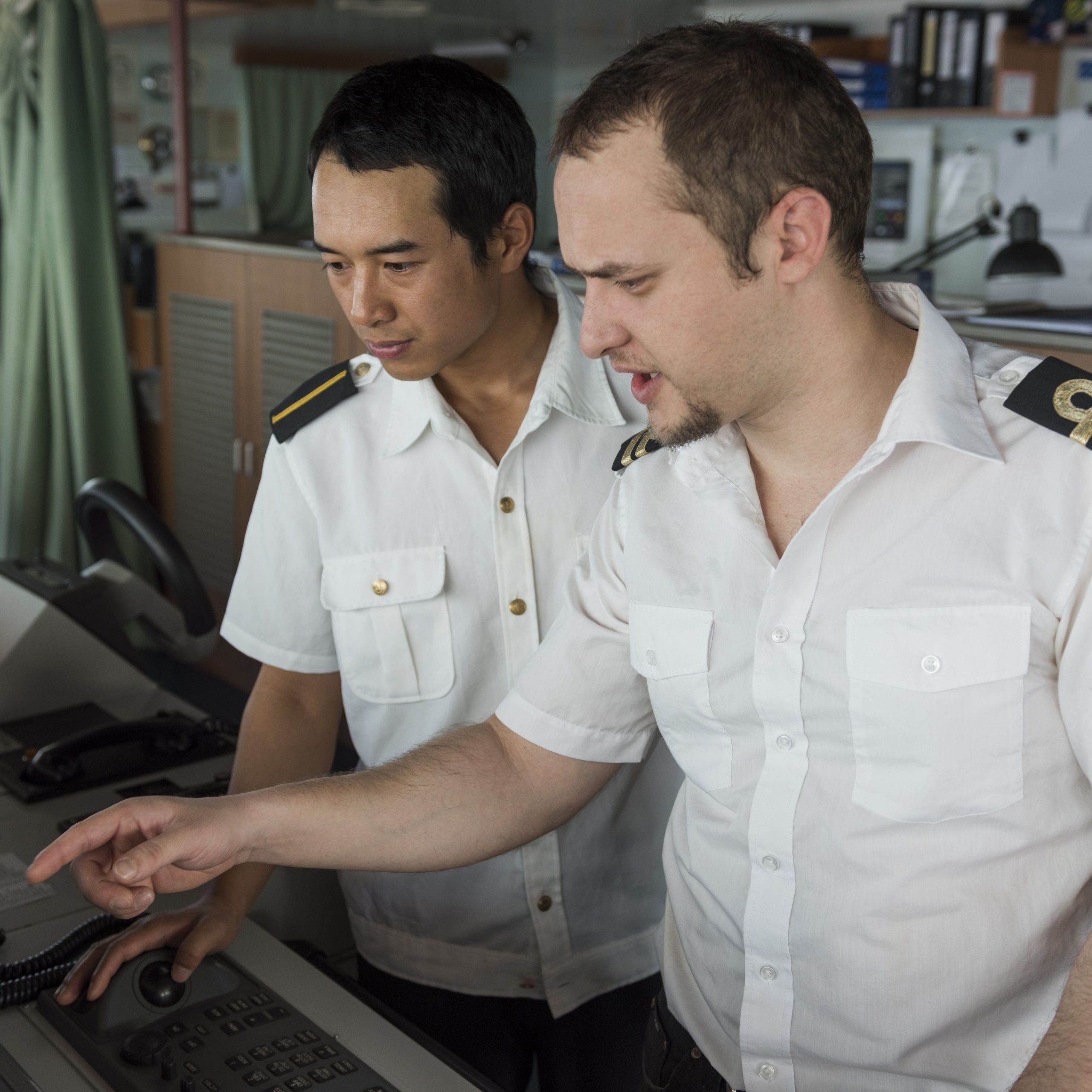Can CMS be a tool for transformative change?
Last week we brought together a group of distinguished and knowledgeable professionals to talk all things competency management. We asked how competency management can help us prepare our people and organisations for tomorrow, discussed how to successfully implement a competency management system, and covered far more ground than we had thought possible in an hour.
With competency management being such a hot topic right now, and with this session sparking new conversations and a deluge of exciting questions, we felt it is important to share the fantastic contributions from the panellists with a wider audience. Read on to learn more.
Date: 28th April 2021
Panellists:
– Dr Phillip Belcher, Marine Director, INTERTANKO
– Yvette De Klerk, Head of Training, Ship Management, Wallem Group
– Adam Lewis, Head of Training & Operations, International Maritime Employers Council Ltd.
– Capt. John Lloyd, Chief Executive, The Nautical Institute
– Capt. Sanjeev Soni, Managing Director, Ocean Technologies Group
Moderator: Raal Harris – Group Creative Director, Ocean Technologies Group
On behavioural competencies
Behavioural competencies, and the role they will in ensuring our people are equipped for today, and for the future, was topic that got a lot of airtime during the discussion.
Opening the up the conversation, Dr Phillip Belcher first praised the high level of work and standards mariners have maintained throughout the pandemic and emphasised the need to provide seafarers “the tools to manage situations that are not just technical side, which is often covered in STCW, but in the wider remit of looking after people and working with others”.
BCAV brings another dimension to what has traditionally been included and measured within competency management. All of our panellists agreed that the development of ‘soft skills’ will be critical to our seafarer’s continued growth and effectiveness.
“We need to embrace a range of skills. Some of those are personal skills about empathy and how people approach critical thinking, and so on. A whole range of life skills [need to be considered] around how people communicate how they collaborate”, said Capt. John Lloyd.
Behavioural competencies are still a new idea in many organisations. Those that have embraced BCAV or developed their own behavioural competencies are certainly seeing the rewards, but there is still a way to go before the measurement and management of ‘soft skills’ becomes the norm in the industry.
On new vessels and technologies driving skill shortages
The speed at which increasingly technologically advanced vessels and processes are entering service is driving a need for businesses to move faster and to ensure that their people are equipped with the knowledge, skills and mindsets that are necessary to work in today’s environments.
Yvette and Adam both emphasised that STCW is the minimum standard we expect of our seafarers. With more advanced vessels coming on stream, and a higher reliance on technology, there is an increasing requirement for higher levels of competency in areas not included in the current form of STCW. Yvette said there was already a need for “more technologically skilled people for the operation of more technologically advanced vessels”.
An advantage competency management offers is that it supports an adaptive approach. The flexibility a competency management system offers, enabling companies to define and design competencies in the areas they deem critical to achieving their goals, means competency management can move faster.
“competences are moving ahead a lot quicker than STCW allows so company requirements or industry requirements are moving much quicker”. Adam Lewis
On supporting and growing seafarers
When we posed the question “Where do see CMS playing the biggest role in your organisation?” in a poll ahead of the event, crew career and succession planning tied with “operational efficiency” for the top spot. This reflected both the discussions we have had with our customers, and the views of the panel.
“we do need to continue to support seafarers, continue to build on their competence, so that seafarers have the right tools for them to succeed both in their job, as professionals, and in their ongoing career”, said Dr Phillip Belcher
Adopting competency management benefits an organisation and the people within it. By supporting and growing employees, you have a happier, more motivated workforce and one that is able to help your business thrive in the future. Over the course of the session, the panellists repeatedly made the point that competency management supports the seafarer.
Captain John Lloyd’s view, and one echoed by comments from the rest of the group, is that competency management is “about making sure that our colleagues and our seafarers are capable for now and for the future”.
On how not to use competency management
Both Captain John Lloyd and Sanjeev made points around ensuring that competency management was brought in to benefit employees and warned against using it as a tool to reprimand underperforming crew.
“[competency management] isn’t about if you fail this assessment you’re sacked; it is about finding out what development needs there are, and how they can be better prepared for the for their role on that ship”, said Capt. John Lloyd
This point ties closely with that around getting buy-in, that of the need for clear communication and sharing the both the business reason a competency management system is being. If someone sees competency management as a tool that will help them to be recognised for the excellent work they do then they are more likely to invest in it personally.
On where to start with a competency management system
“start small with CMS, get it established and then grow organically” Yvette De Klerk
The advice from all involved was that starting small with competency management, either by implementing an existing standard or by starting with a few competencies and then growing the number as buy-in and results grow. The internal resources, expertise and manpower all play a part in considering where to start with a CMS.
If you want to dive deeper into what is involved in implementing a CMS you can get a copy of our free guide here
On getting buy-in and making a success of competency management
The ultimate key to the success when bringing a new system or process or system into a business is always getting buy-in from the stakeholders.
Yvette believes that transparency on the process and the purpose of competency management is key to ensuring buy-in from mariners and ensuring that it is considered a benefit rather than a burden. “we can get the buy in is if it is a transparent process. If it is clear the objectives of what a company is trying to achieve by having this is clear and clearly communicated the outcome”, said Yvette.
While the seafarers are undeniably the main stakeholders for competency management, Sanjeev also noted the importance of getting buy-in and understanding from the management. In his experience, he said that the senior management need to understand the resources required to implement and manage a competency management system; and, that competency management is an ongoing and evolving process that requires an ongoing commitment.
For both mariners and managers, communication and clarity of objectives are key to getting buy-in and ensuring the success of competency management.
Competency Management
If you want to know more about what bringing a CMS into your business can do for you, are looking to transition to a new system that is better suited to your needs, or have any questions about what was covered above, please get in touch
Contact us today to learn how competency management can help you train and retain your people
Why choose Ocean CMS?
- We provide bespoke implementations, tailored to your business needs
- We offer a phased approach, allowing you to start small, and scale up as you see the need
- We are pioneers in competency management and have the experience to help navigate you from CMS implementation through to success.
Interested in implementing a CMS? Use the below button to get our guide to best practices
To learn more about our Competency Management System
We do need to continue to support seafarers, continue to build on their competence, so that seafarers have the right tools for them to succeed both in their job, as professionals, and in their ongoing career
Start small with CMS, get it established and then grow organically
Competences are moving ahead a lot quicker than STCW allows so company requirements or industry requirements are moving much quicker
Competency management is about making sure that our colleagues and our seafarers are capable for now and for the future
Setting Standards with Competency Management
Why is Competency Management becoming so important?
Would you like to learn more about CMS?
We have created a section of our YouTube channel which is dedicated to helping people learn more about Competency Management. Featuring recordings of two full webinars plus bite-sized snippets covering FAQ’s such as:
- Why implement a CMS?
- What are the benefits of a digital CMS?
- Why is competency management becoming increasingly important?
- What are the key components of a CMS?
and many more.


